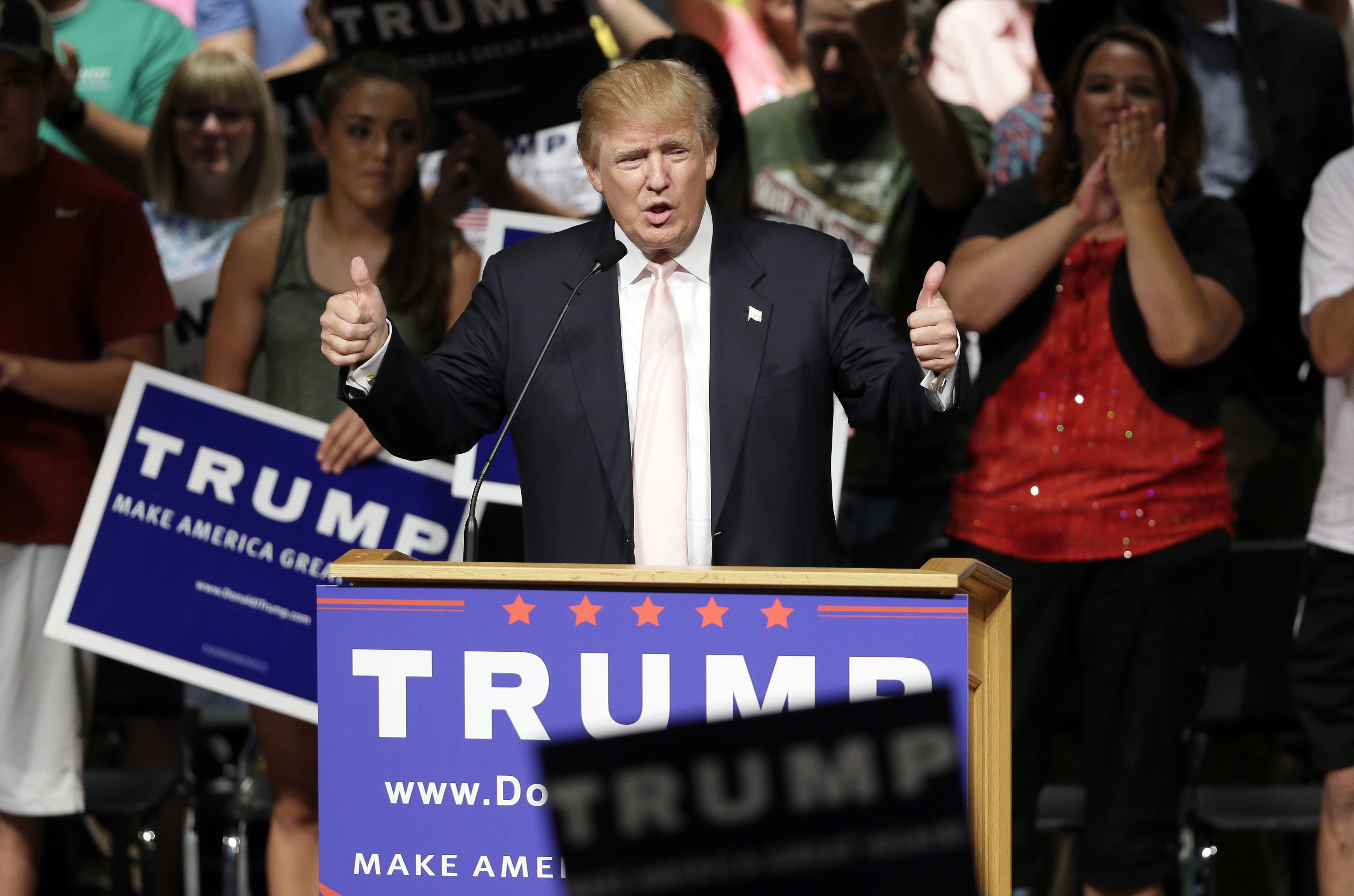How to run for president if you're not a politician (or Donald Trump)
Career politicians dominate the presidential primary field. But that doesn't have to be the case.


Do we believe in democracy or not?
Because almost everybody assumes that to be elected president, a candidate needs to hold or have held political office, preferably senator or governor.
It should be obvious that this doesn't have to be the case. Yes, to be a good president, you need a good understanding of politics and policy. But elected officials aren't the only people who can master those fields.
The Week
Escape your echo chamber. Get the facts behind the news, plus analysis from multiple perspectives.

Sign up for The Week's Free Newsletters
From our morning news briefing to a weekly Good News Newsletter, get the best of The Week delivered directly to your inbox.
From our morning news briefing to a weekly Good News Newsletter, get the best of The Week delivered directly to your inbox.
You might say that being a governor prepares you for running the executive branch of the federal government, or that being a senator gives you experience in getting a bill through Congress. Fair enough. But the simple truth is that being president of the United States is completely unlike any other job on the planet and that nothing can adequately prepare you for it. The expansion of the federal government, combined with the concomitant weakening of state prerogatives, have made being governor akin to sailing a dinghy compared to the president's battleship. And while a Senate office might teach you about parliamentary tactics, it won't teach you important executive skills.
What's more, as trite as it may sound, the most important qualities of a president are character and sound judgment. No experience can prepare you for being president on Sept. 11, 2001, or during the 2008 financial crisis. There is no right ordering of items on a resume that makes a person more likely to make the right decisions in those moments. And character and judgment, mercifully, can be found in every walk of life. The last non-politician to become president was Eisenhower, and everyone today recognizes that he was one of the best presidents of the 20th century.
But nowadays, it is virtually a given that you have to be a career politician before becoming president. And because everybody assumes this is true, it becomes a self-fulfilling prophecy.
This is a shame. From a practical perspective, it unnecessarily narrows the pool of qualified applicants, shutting out people who have a record of character, sound judgment, leadership, and organizational competence, not to mention a useful vision for the future of the country.
A free daily email with the biggest news stories of the day – and the best features from TheWeek.com
And from a moral perspective, it undermines the ideals of democracy, which, after all, presupposes citizen participation and the equality of all citizens under the law. Of course, not everyone is qualified to be president, but a political culture that limits access to the Oval Office to a caste of career politicians is one that is, in an important way, unhealthy.
So one of the blessings of our ongoing populist moment of anti-politician anger has been the rise of non-politician candidates. Carly Fiorina, Ben Carson, and certainly Donald Trump bring a different perspective from the career politicians who have graced the Republican stage.
The former CEO of the world's largest computer maker ought to, at least, have a credible shot at the presidency. One of the most celebrated neurosurgeons in the country — who rose from humble roots, and served as a community activist and inspirational speaker for many years — ought to be considered a qualified candidate. Indeed, Mitt Romney might have made a better candidate if he hadn't run for governor of Massachusetts and hung the albatross of Romneycare around his neck. And Donald Trump...well, he should be disqualified from the presidency for being Donald Trump, not for not being a politician.
And that's the thing about the Trump phenomenon, isn't it? Whatever his flaws, he clearly isn't a career politician. He doesn't look like one, he doesn't act like one, he doesn't think like one, and he certainly doesn't talk like one. And it resonates with an electorate that justifiably believes career politicians have made a mess of things and that it's time for a new direction.
But citizen-candidates also typically have a dark side. All fired up with self-righteous anti-establishment anger, and fed by their own ego (a very big one is needed for anyone to run for office), too many of our citizen-candidates think that policy and politics don't matter, as opposed to applying a fresh look and fresh direction to policy and politics.
There is a temptation, when you are riding an angry populist wave, to equate policy platforms with the usual political disingenuousness. There is a suspicion that "serious" policy agendas are what got us here in the first place. But policy actually matters, and the way that a CEO or a neurosurgeon goes from being an interesting rabble-rouser to a viable presidential candidate is by proving that they have what it takes for the job.
Political experts are almost unanimous in one belief: that voters are dumb. Campaigns are substance-free because they believe that voters are dumb. But voters are not actually dumb. Policy matters. Reagan's supply-side ideas played a huge role in his victory. Bill Clinton's embrace of free trade, tough-on-crime policy, and welfare reform led him to victory. The Contract with America played a huge role in the victory of Newt Gingrich's Republicans.
The case for citizen-candidates is that politics is too serious and too important to be left to politicians. Citizen-candidates need to show that by developing innovative, interesting, and profound policy agendas.
Pascal-Emmanuel Gobry is a writer and fellow at the Ethics and Public Policy Center. His writing has appeared at Forbes, The Atlantic, First Things, Commentary Magazine, The Daily Beast, The Federalist, Quartz, and other places. He lives in Paris with his beloved wife and daughter.
-
 Striking homes with indoor pools
Striking homes with indoor poolsFeature Featuring a Queen Anne mansion near Chicago and mid-century modern masterpiece in Washington
-
 Why are federal and local authorities feuding over investigating ICE?
Why are federal and local authorities feuding over investigating ICE?TODAY’S BIG QUESTION Minneapolis has become ground zero for a growing battle over jurisdictional authority
-
 ‘Even those in the United States legally are targets’
‘Even those in the United States legally are targets’Instant Opinion Opinion, comment and editorials of the day
-
 The billionaires’ wealth tax: a catastrophe for California?
The billionaires’ wealth tax: a catastrophe for California?Talking Point Peter Thiel and Larry Page preparing to change state residency
-
 Bari Weiss’ ‘60 Minutes’ scandal is about more than one report
Bari Weiss’ ‘60 Minutes’ scandal is about more than one reportIN THE SPOTLIGHT By blocking an approved segment on a controversial prison holding US deportees in El Salvador, the editor-in-chief of CBS News has become the main story
-
 Has Zohran Mamdani shown the Democrats how to win again?
Has Zohran Mamdani shown the Democrats how to win again?Today’s Big Question New York City mayoral election touted as victory for left-wing populists but moderate centrist wins elsewhere present more complex path for Democratic Party
-
 Millions turn out for anti-Trump ‘No Kings’ rallies
Millions turn out for anti-Trump ‘No Kings’ ralliesSpeed Read An estimated 7 million people participated, 2 million more than at the first ‘No Kings’ protest in June
-
 Ghislaine Maxwell: angling for a Trump pardon
Ghislaine Maxwell: angling for a Trump pardonTalking Point Convicted sex trafficker's testimony could shed new light on president's links to Jeffrey Epstein
-
 The last words and final moments of 40 presidents
The last words and final moments of 40 presidentsThe Explainer Some are eloquent quotes worthy of the holders of the highest office in the nation, and others... aren't
-
 The JFK files: the truth at last?
The JFK files: the truth at last?In The Spotlight More than 64,000 previously classified documents relating the 1963 assassination of John F. Kennedy have been released by the Trump administration
-
 'Seriously, not literally': how should the world take Donald Trump?
'Seriously, not literally': how should the world take Donald Trump?Today's big question White House rhetoric and reality look likely to become increasingly blurred
